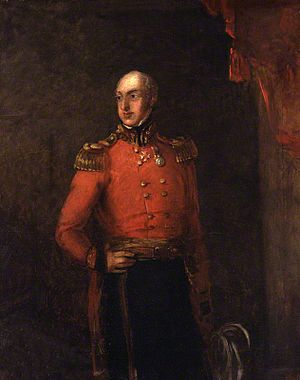William George Keith Elphinstone
| Sir William George Keith Elphinstone | |
|---|---|

Major-General William Elphinstone (1836-1839)
|
|
| Born | 1782 Scotland |
| Died | 23 April 1842 Afghanistan |
| Service/branch | British Army |
| Years of service | 1804–1842 |
| Rank | Major General |
| Commands held |
33rd Regiment of Foot Kabul garrison |
| Battles/wars |
Napoleonic Wars First Anglo-Afghan War |
Major-General William George Keith Elphinstone CB (1782 – 23 April 1842) was an officer of the British Army during the 19th century.
Born in Scotland in 1782; he was the son of William Fullerton Elphinstone, who was a director of the British East India Company, and nephew of Admiral George Keith Elphinstone, 1st Viscount Keith.
Elphinstone entered the British Army in 1804 as a lieutenant; he saw service throughout the Napoleonic Wars, rising to the rank of lieutenant-colonel by 1813, when he became commander of the 33rd Regiment of Foot, which he led at the Battle of Waterloo in 1815. For his actions at Waterloo, Elphinstone was made a Companion of the Bath, as well as a knight of the Dutch Order of William and of the Russian Order of St. Anna. He left the regiment in 1822. After Elphinstone was promoted to colonel in 1825, he served for a time as aide-de-camp to King George IV.
Elphinstone was promoted to major-general in 1837, and, in 1841, during the First Anglo-Afghan War, placed in command of the British garrison in Kabul, Afghanistan, numbering around 4500 troops, of whom 690 were European and the rest Indian. The garrison also included 12,000 civilians, including soldiers' families and camp followers. He was elderly, indecisive, weak, and unwell, and proved himself utterly incompetent for the post. His entire command was massacred during the British retreat from Kabul during January 1842.
...
Wikipedia
